

Significant advances in veterinary oncology – 60 years on. Significant advances in veterinary oncology – 60 years on - Dobson - 2019 - Journal of Small Animal Practice. Historical background The first edition of JSAP (February 1960) contained a paper entitled “Recent Treatments of Malignant Neoplasia” (Owen 1960).
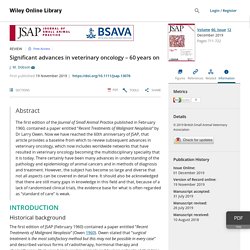
Owen stated that “surgical treatment is the most satisfactory method but this may not be possible in every case” and described various forms of radiotherapy, hormonal therapy and chemotherapy that were being used in animals and human patients at that time. Larry Owen became one of the pioneers of veterinary and comparative oncology, gaining World Health Organisation recognition for the Department of Veterinary Medicine at the University of Cambridge and leading development of both radiotherapy and chemotherapy in the treatment of cancer in domestic animals.
Therefore, as we approach the 60th anniversary of the JSAP, his article provides a fitting starting point to review advances in veterinary oncology over the past 60 years. Current status Pathology & clinical pathology At the start of the discussion to his 1959 paper Earnest Cotchin stated: (99+) (PDF) PDF] Advances in Veterinary Oncology, An Issue of Veterinary Clinics of North America: Small Animal Practice (The Clinics: Veterinary Medicine) by Annette N. Smith.
Nanomedicine in veterinary oncology. - PDF Download Free. Accepted Manuscript Title: Nanomedicine in veterinary oncology Author: Tzu-yin Lin, Carlos O.
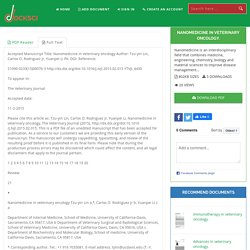
Rodriguez Jr, Yuanpei Li PII: DOI: Reference: S1090-0233(15)00076-3 YTVJL 4430 To appear in: The Veterinary Journal Accepted date: Please cite this article as: Tzu-yin Lin, Carlos O. Review. Oncology Childress Rational Treatment Decisions. 2016 aaha oncology guidelines for dogs and cats. Decision Making in Small Animal Oncology. Integrative Cancer Therapies - All Issues. Sodium Bicarbonate: Powerful Medicine or Quack Treatment? This article on sodium bicarbonate is a chapter from my book Cancer Cured.

If you find it helpful, please support my work and buy my book on Amazon. SODIUM BICARBONATE, ALSO known as baking soda, is a type of salt that can be found in crystalline rock formations in nature. Bicarbonate, the acid-neutralizing portion of sodium bicarbonate, is naturally produced by the human body and used to buffer excess acidity.1 Since one of the metabolic hallmarks of a cancer cell, as first described by Dr. Otto Warburg in 1930,2 is elevated production of lactic acid,3-8 which “directly contributes to tumor growth and progression,”9 it seems reasonable to predict that cancer patients could benefit from additional bicarbonate. When orally-consumed sodium bicarbonate and stomach acid combine, healing carbon dioxide is formed.
The relationship between carbon dioxide and life itself is entirely misunderstood by most people in the medical profession and by society as a whole. The Naked Mole Rat The Queen Bee. ¿Estás Alimentando a Tu Mascota con Carcinógenos? Por la Dra.

Becker Hoy hablé con el Dr. Robert Turesky, un científico investigador que trabaja para la División de Ciencias de la Salud Ambiental en el Departamento de Salud del Estado de Nueva York. El Dr. Integrative Holistic Healing Center: Cancer Prevention Ideas. Vitamins: B-Complex – Most people who supplement are relatively OK here, but if they are not or you are looking for a “better” supplement, try Source Naturals Co-enzymate B-Complex.
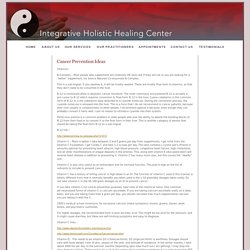
This is a sub-lingual. If you swallow it, it will be mostly wasted. These are mostly final-form b-vitamins, so that they don’t need to be converted in the liver. New Cancer Treatments - Independent Cancer Research Foundation, Inc. EVIDENCE BASED NATURAL HEALTH - Home. Welcome to the Natural Medicines Research Collaboration. Integrative Oncology Guidelines. The SIO Clinical Practice Guidelines are referenced in MedLine and are posted on the National Institutes of Health National Center for Complementary and Integrative Health website ( The SIO Clinical Practice Guidelines are the only comprehensive evidence-based guidelines for incorporating complementary and integrative therapies into conventional oncology clinical practice.
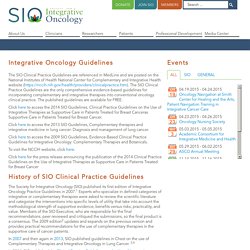
The published guidelines are available for FREE. Clinical Practice Guidelines. Journal of the Society for Integrative Oncology Impact Factor on ResearchGate - Impact Factor Rankings (2013, 2014 and 2015) Journal description The Society for Integrative Oncology (SIO) is a non-profit, multi-disciplinary organization of professionals dedicated to studying and facilitating the cancer treatment and recovery process through the use of integrated complementary therapies.

Academic Health Centers and the Growth of Integrative Medicine. Clinical Practice Guidelines on the Use of Integrative Therapies as Supportive Care in Patients Treated for Breast Cancer. Rationale and Importance Worldwide, an estimated 33%–47% of individuals diagnosed with cancer use complementary, alternative, or integrative therapies during cancer treatment (1).
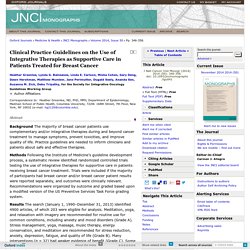
Women with breast cancer are among the highest users of such therapies and usage has been increasing (2–7). An estimated 48%–80% of North American breast cancer survivors use complementary and integrative therapies following diagnosis (2,4,5,8–12). Clear clinical practice guidelines are needed to inform clinicians and patients about the evidence supporting or discouraging the use of specific complementary and integrative therapies for defined outcomes during and beyond breast cancer treatment, including symptom management. Definitions. Advancing the Evidence Base and Transforming Cancer Care Through Interprofessional Collegiality: The Society for Integrative Oncology.
“Integrative oncology”: The Trojan horse that is quackademic medicine infiltrates ASCO « Science-Based Medicine. You might have noticed that I didn’t produce a post last week, something that’s unusual for me, given how prolific I have been in the blogosphere.
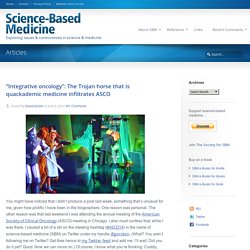
One reason was personal. The other reason was that last weekend I was attending the annual meeting of the American Society of Clinical Oncology (ASCO) meeting in Chicago. National Cancer Institute’s Support of Research to Further Integrative Oncology Practice. Jeffrey D.
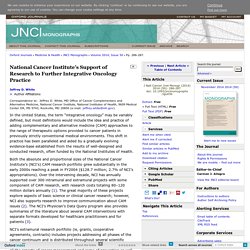
White + Author Affiliations Correspondence to: Jeffrey D. NCCAM Criticism from a Not-Quite-Opponent « Science-Based Medicine. The demographic of SBM readers are likely to remember the early Miller Lite beer television commercials where sports personalities debated as to whether the beverage “tastes great” or was “less filling.” In one classic version, New York Mets’ Marv Throneberry breaks the shouting match to level his decision: “I feel strongly both ways.” My colleagues at Science-Based Medicine have generally been opposed completely to the existence of the NIH’s National Center for Complementary and Alternative Medicine (NCCAM). The primary objection is that the Center awards roughly $125 million per year in taxpayer dollars to studies that are generally not based on a strong scientific foundation or, in some cases, absolutely no scientific basis.
On the other hand, the best NCCAM-supported studies have provided fruitful results, if not negative with regard to clinical outcomes. Advancing the Science of Integrative Oncology to Inform Patient-Centered Care for Cancer Survivors. + Author Affiliations Correspondence to: Jun J. Mao, MD, MSCE, Department of Family Medicine and Community Health, University of Pennsylvania, 227 Blockley Hall, 423 Guardian Drive, Philadelphia, PA 19104-6021 (e-mail: jun.mao@uphs.upenn.edu). Cancer survivors, millions in number, often struggle to manage the physical as well as emotional, social, and spiritual consequences of their cancer and its necessary conventional treatments (1).
Building the Evidence Base for Integrative Approaches to Care of Cancer Survivors. Josephine Briggs + Author Affiliations Correspondence to: Josephine Briggs, MD, National Center for Complementary and Alternative Medicine, National Institutes of Health, 9000 Rockville Pike, Bethesda, MD 20892 (e-mail: briggsj@mail.nih.gov). Like hospice and palliative care, the integrative medicine movement began as edgy outsiders.
But in the last 10–15 years, integrative oncology practices, often tied with integrative medicine programs, are being established in major medical institutions across the country. Many are embedded in medical centers that are leaders in the development and provision of the most advanced modern technologies for cancer care. Not surprisingly, since integrative oncology is a relatively new movement, the science is just beginning. The Evidence Base for Integrative Approaches to Cancer Care. The most recent issue of the Journal of the National Cancer Institute Monographs features a series of articles on the role of integrative oncology in cancer survivorship.
I was pleased to have been invited to write a perspectives piece for this issue on building the evidence base for integrative approaches to the care of cancer survivors. Integrative oncology is a relatively new movement, and the research is in early stages. But due in part to patient demand for a more “holistic” approach to care as well as the desire of physicians to develop a style of practice that will facilitate changed relationships with patients, with more emphasis on healing and less on technical advice, the movement, along with the evidence base, is growing.
Cell. Integrative oncology: really the best of both worlds? : Nature Reviews Cancer. Table of Contents — November 2014, 2014 (50)